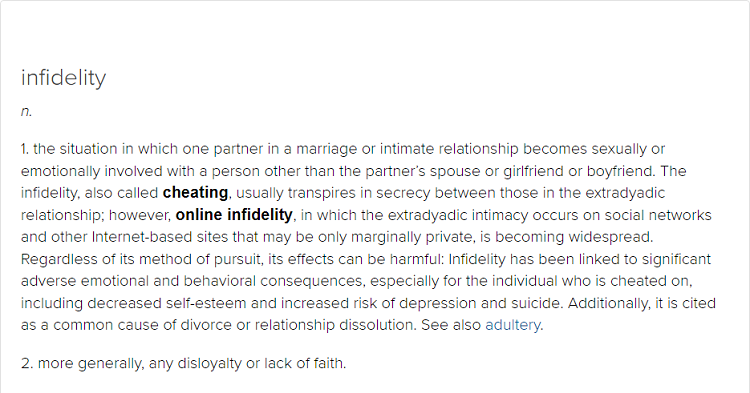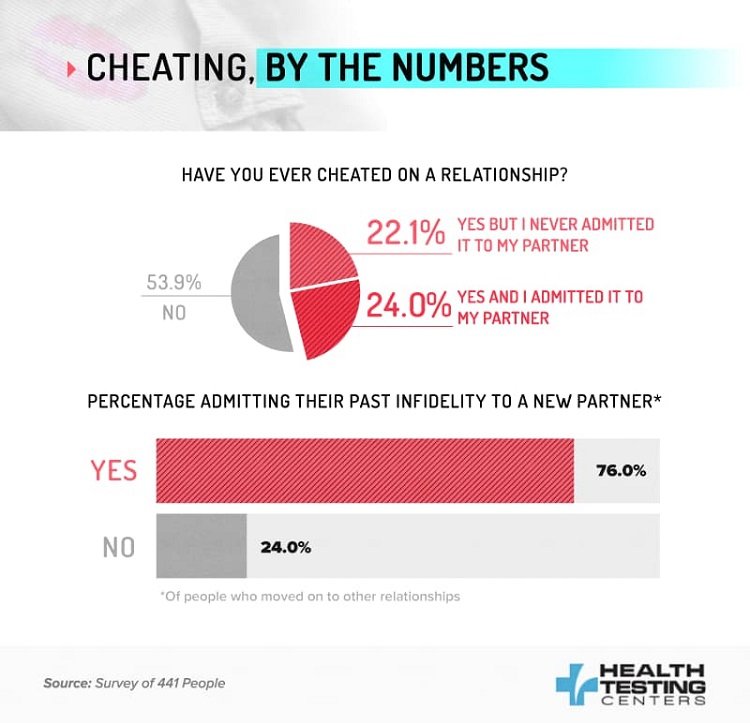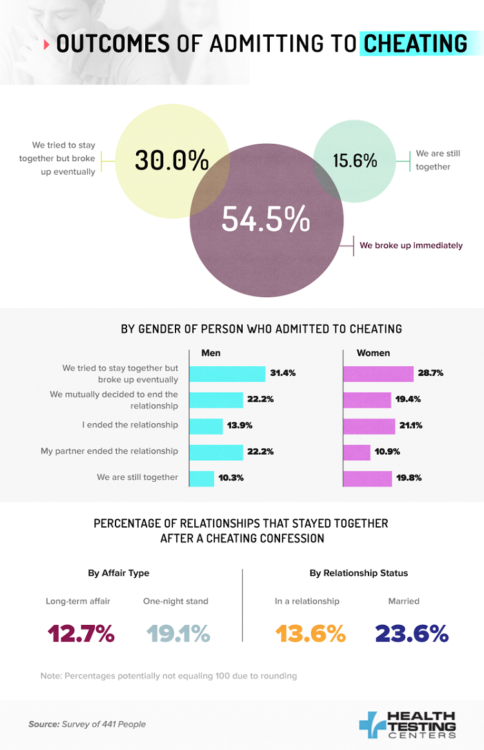Can a cheating relationship survive infidelity? That is the ultimate focus of this post. We examine some relationship study data to provide you with a realistic picture of what to expect in the aftermath of cheating.
Now, before we get into this topic, it’s vital to understand that, despite the statistics, we’ll look at, there is no one answer to whether or not a cheating relationship can survive.
That is because, in the end, the success of a cheating relationship is determined by a variety of circumstances, including the reasons why someone opted to cheat in the first place.
Some couples may be able to overcome the betrayal and reestablish their relationship, but others may discover that the trust has been irreparably damaged and that the relationship cannot be recovered.
I just want you to keep that in mind and not use the facts in this post to justify your actions or as a prophecy of doom.
What is infidelity?
The definition of infidelity can vary from person to person.
Generally, though, infidelity usually refers to an extramarital affair or an extramarital sexual encounter.
Additionally, while not every form of infidelity is considered a sin by some religions and cultures, most people consider it to be immoral behaviour.
Psychologically speaking, the APA Dictionary of Psychology defines infidelity (cheating) as
“The situation in which one partner in a marriage or intimate relationship becomes sexually or emotionally involved with a person other than the partner’s spouse or girlfriend or boyfriend. The infidelity, also called cheating, usually transpires in secrecy between those in the extradyadic relationship.”
It also makes a distinction with online infidelity.

The different types of affairs
Now, the fact that different people often have different understandings of what constitutes cheating in a relationship isn’t the only tricky thing when it comes to infidelity, there are also different types of affairs that can occur in a relationship.
For example, one type is an emotional affair, which is when one person in a relationship begins to have feelings for someone else and share those feelings with that person.
This type of affair can be just as damaging to the relationship because it can lead to the development of feelings of jealousy and mistrust.
Another type of affair is a physical affair, which is when two people engage in sexual activities with each other outside of their relationship.
Generally speaking, however, there are five distinct forms of affairs, according to the article “5 Common Types of Affairs” on verywellmind.com.
They are as follows:
- Romantic
- Casual
- Emotional
- Cyber
- Sanctioned
Romantic Affairs can be romantic, also referred to as a “heart affair.” Romantic relationships are frequently sexual liaisons that involve an element of romanticism and emotional commitment.
When both partners in a relationship agree to it, the phrase can also refer to a type of non-monogamy, however, this is less prevalent.
A casual affair is most usually defined as a sexual encounter between two people that is primarily physical in nature without the anticipation of a more structured romantic engagement. Additionally, it is referred to as a “fling.”
An emotional affair is defined by the absence of sexual intimacy but the presence of intense or enduring emotional connection.

Emotional affairs can readily develop into sexual affairs and pose the same harm to the primary relationship as sexual affairs do.
Even if this type of affair does not escalate into physical contact, the consequences can be just as damaging.
Emotional affairs frequently involve a level of intimacy that is deeper and more profound than a sexual affair.
An online or cyber affair occurs through the use of a chat room, webcam, email, or text. It may be anonymous, or it may be between strangers who simply know each other’s basic information, such as their names.
Alternatively, it could occur online with someone the individual knows in real life.
A cyber affair frequently involves emotional and/or sexual overtones.
While the lovers in a cyber affair may never meet in person, the emotional connection and frequently sensuous aspect of the affair can strain one or both of the affair participants’ committed relationships.
A sanctioned affair is one in which a couple agrees on the kind of sex and emotional intimacy that are permissible with someone other than their primary partner.
Swinging, dating, polyamory, and ménages à trois or group sex are among the examples.
An open marriage or consensual nonmonogamy that works for both partners must adhere to the ground rules established at the outset, however, otherwise, this form of relationship is no longer “permissible.”
The point here is that affairs do not always follow similar patterns and are different in each case.
Yes, they all have elements of betrayal, infidelity, and deception in common. However, how these factors manifest themselves in various cases of adultery might vary greatly.
However, based on what we know, no matter what form of cheating you engage in, it all appears to have implications for the couples involved.
What are the consequences of infidelity (cheating)?
Despite the fact that there are different types of affairs and countless reasons why cheating happens in relationships, there are also always consequences as a result of one or both partners straying.
There are a number of potential consequences that can result from cheating in a relationship.
We know that most types of cheating will at least lead to a decrease in trust between partners and can damage the relationship beyond repair.
Infidelity can also lead to feelings of insecurity and jealousy and can cause the betrayed partner to feel isolated and alone.
These are just some of the major consequences that can occur when someone cheats in a relationship.
But other negative outcomes can include things like:
Altered behaviour and intimacy in the relationship
When someone cheats on their partner, it can cause a lot of damage to the relationship.
For example, infidelity can lead to a decrease in intimacy in the relationship, as well as changes in behaviour.
For instance, the cheater may become more secretive and withdrawn, while the partner may become more insecure and needy.
An increase in arguments and fights
When one partner is unfaithful, it can create a great deal of tension and mistrust in the relationship.
This can lead to a lot of arguments as the couple tries to figure out what happened and how to move forward.
Financial disputes
There are also a few ways that infidelity can lead to financial disputes between a couple.
For one, if the unfaithful partner has been spending money on their affair, that could lead to tension and arguments when discovered.
Additionally, if the couple decides to break up, the cheated-on partner may feel like they are entitled to a larger share of the assets since they were not part of the decision to cheat.
The fight around shared assets can lead to protracted and very expensive legal battles.
Dissatisfaction with work
Infidelity can also impact someone’s work life.
For example, if someone is having an affair, they may be less likely to want to go to work because they would rather be spending time with their affair partner.

Conversely, however, if someone is the victim of infidelity, concentrating on and feeling satisfied with work can become a real struggle because all they can think about is the cheating relationship.
Low self-esteem and self-confidence
When someone is cheated on, it can be incredibly damaging to their self-esteem and confidence.
They may feel like they are not good enough, that they are not attractive enough, or that they are not worth keeping around.
That can lead to a lot of feelings of self-doubt and insecurity.
Self-blame or shame
If a person is cheated on, they may feel like it is their fault.
They may feel like they are not good enough or that they did something wrong.
That can lead to self-blame or shame.
They may end up blaming themselves for the affair, or they may feel shame as a result.
Struggling to trust people again
If someone has been cheated on, it can be very difficult for them to trust other people again.
This is because they have likely been hurt in a very significant way, and may feel like they can’t trust anyone.
Additionally, they may feel like they need to be more careful about who they trust, as they may not want to be hurt again.
That might have repercussions for future relationships.
A sense of loss, unhappiness and betrayal
Infidelity can also create a sense of loss, unhappiness, and betrayal in the victim because it can damage the trust that was built in the relationship.
When someone is cheated on, it can feel like they are not good enough and that their partner was not satisfied with what they had.
This can lead to a feeling of sadness, isolation, and anger.
Frequent infidelity is likely to make the victim feel they are not desirable or worthy of loyalty.
Furthermore, frequent infidelities, in the case of someone who is continually forgiving and accepting the cheater back, can eventually lead to low self-esteem and other maladaptive behaviours.
For instance, infidelity can cause social isolation for the victim because their partner wasn’t able to commit fully to the relationship.
A desire to seek revenge or even out the perceived wrongdoer
There are also a few ways that infidelity can cause the victim to want to seek out revenge and get even with the perceived wrongdoer.
One way is that the victim may feel like they have been cheated on, which can lead to a feeling of betrayal.
The victim may also feel like they have been abandoned or neglected.
All of these feelings can lead to a desire for revenge.
Additionally, the victim may feel like they have been violated and their trust has been broken.
This can also lead to a desire for revenge.
Now, obviously, this list of consequences of infidelity is far from complete, but as you can see, infidelity does have a number of consequences for the victim.
In some cases, infidelity can lead to a desire for revenge.
For other victims, the consequences may not be nearly as severe, but that doesn’t mean they are any less painful or damaging.
The important thing to remember is that no matter what the consequences of infidelity are for you, they don’t necessarily indicate a bad marriage, that your partner doesn’t love you, that the whole relationship was a mistake, or that you’re not good enough.
It’s important to remember that relationships are part of life and life happens, callous as that may sound.
People cheat for a myriad of reasons, some of them stupid and some of them out of desperation.
Now, of course, infidelity is still at its core and intimate betrayal and is very difficult to justify.
Personally, I’ve always been a firm believer in rather breaking up first when you’re unhappy before moving on to someone else. But that’s just me.
The question we are here to consider, however, is can a cheating relationship survive, especially based on divorce statistics, and what we pick up from relationship research.
My gut and experience as a marriage coach tell me that rebuilding trust and moving on from this type of relationship transgression would be very difficult.
But those are just my feelings. Feelings are not facts.
Can a cheating relationship survive – what some research suggests?
According to Joe Kort, PhD, in his psychologytodaycom article, some researchers estimate that approximately 2.3% of married women and approximately 4.3% of married males engage in marital infidelity.
According to other research, up to 25% of men and 11% of women will end up in bed with someone other than their partner at some point in their lives.
In other words, 25/100 men or 11/100 women will cheat on their partners at some point in their relationship.
Chances are those figures are even higher in the reality.
Kort also points out that a recent study also strongly suggests that, contrary to popular cultural and religious beliefs and expectations, humans are not “programmed” for monogamy.
However, that is an issue that warrants further research and discussion.
Regardless, what that could suggest, however, is that people are essentially hardwired to stray outside of the confinements of their committed relationships.
In that sense, infidelity could be argued to actually be normal human behaviour, it is, therefore, to be expected.
Yet, I have a feeling that every betrayed spouse would feel differently about that.
Be it as it may, however, the more important question in this post is can a cheating relationship survive, according to what some research suggests?
Well, according to healthtestingcenters.com, they conducted a poll of 441 persons who admitted to cheating on their relationships.
They wanted to know how long it took them to notify their significant other, why they cheated, and how their spouse reacted when they found out.
The following table summarises the overall prevalence of cheating:
According to their study results, 46.1% have cheated in a relationship.
Additionally, one in four respondents admitted to cheating on their partner.
Almost half of all men and women who admitted to cheating did it during the first week.
It was, however, dependent on whether the person was in a relationship or married that the wait time varied.
Within a week, 52.4% informed their spouse about the adultery, compared to 29.2% of married respondents.
Simultaneously, 47.9% delayed six months or longer before confessing their adultery, compared to 20.4% of those in relationships.
Additionally, the survey revealed intriguing data regarding how much spouses divulged about their infidelity to the other, as well as concerningly low contraceptive use while cheating.
You are welcome to read the research on your own.
What we are interested in, though, is what they discovered in the aftermath of adultery.
According to their research, 30% attempted to remain together but eventually divorced, 15.6% remained together, and 54.5% split up immediately.
Thus, 84.5% of couples that experienced adultery as a result of it ended up separating.
Nonetheless, the results differed greatly by the cheater’s gender.
Approximately 20% of female cheaters remained in their relationship, compared to approximately 10% of male cheaters.
Meanwhile, 22% of male cheaters reported that their partner abandoned the relationship immediately upon learning of the infidelity, compared to almost 11% of female cheaters.
Overall, relationships were more likely to end than marriages following a cheating episode, and, as expected, long-term affairs resulted in a larger rate of breakups.
This data strongly coincides with other research I’ve seen, some of which I’ve already discussed in a post, and some as follows.
Shackelford et al. (2002) assert that evolutionary theory predicts and research demonstrates that men are less likely to forgive sexual infidelity and more likely to end a relationship due to sexual infidelity, whereas women are less likely to forgive and more likely to end a relationship due to emotional infidelity.
Additionally, Charny & Parnass (1995) found that when someone stays with a cheater out of fear, they are more likely to seek retribution, avoid conflict, and become generally more rude and hostile towards the partner.
For instance, in a study of how adultery affects marriage, researchers analysed 62 cases of infidelity involving professional therapists.
Almost half of the time, marriages were preserved following adultery but were defined as negative, devoid of substance, or with a bleak future.
The second most prevalent outcome, occurring in 34% of the sample, was divorce.
Finally, couples stayed together 15% of the time and were described as having improving and strengthening relationships by therapists.
Based on these results from various independent research projects, it doesn’t seem to suggest that a cheating relationship has a high probability of surviving the aftermath of infidelity.
The research data unfortunately do not support the notion that a couple will be able to restore trust, overcome their marital problems, and repair their relationship very easily.
It seems very unlikely.
That said, it’s also worth pointing out that some data do indicate that 15% of couples in cheating relationships managed to overcome their emotional baggage and relationship betrayal to not only become more stable following the discovery of infidelity but actually grow stronger as a couple.
So there is hope in some cases.
But make no mistake, to repair broken trust and trust an unfaithful spouse again, let alone reaching a point where you have high relationship satisfaction again, will require a Herculean effort.



